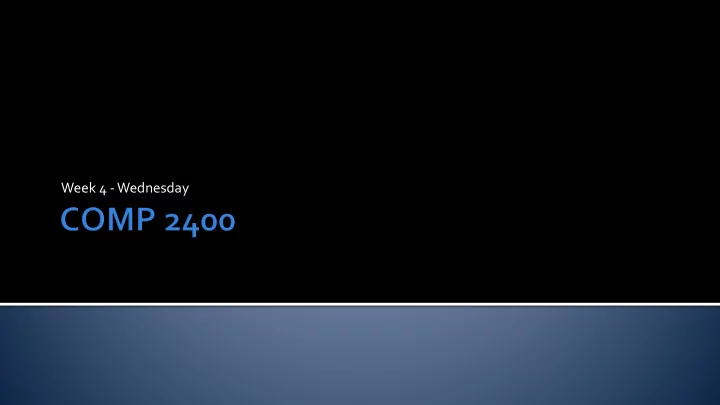

Week 4 -Wednesday
What did we talk about last time? Functions
Unix never says "please." Rob Pike It also never says: "Thank you" "You're welcome" "I'm sorry" "Are you sure you want to do that?"
Defining something in terms of itself To be useful, the definition must be based on progressively simpler definitions of the thing being defined If a function calls itself (directly or indirectly), it's recursive
Explicitly: n ! = ( n )( n – 1)( n – 2) … (2)(1) Recursively: n ! = ( n )( n – 1)! 1! = 1 6! = 6 ∙ 5! 5! = 5 ∙ 4! ▪ 4! = 4 ∙ 3! ▪ 3! = 3 ∙ 2! 2! = 2 ∙ 1! 1! = 1 6! = 6 ∙ 5 ∙ 4 ∙ 3 ∙ 2 ∙ 1 = 720
Two parts: Base case(s) Tells recursion when to stop For factorial, n = 1 or n = 0 are examples of base cases Recursive case(s) Allows recursion to progress "Leap of faith" For factorial, n > 1 is the recursive case
Top down approach Don't try to solve the whole problem Deal with the next step in the problem Then make the "leap of faith" Assume that you can solve any smaller part of the problem
Problem: You want to walk to the door Base case (if you reach the door): You're done! Recursive case (if you aren't there yet): Take a step toward the door Problem Problem Problem Problem Problem
Base case ( n ≤ 1): 1! = 0! = 1 Recursive case ( n > 1): n ! = n ( n – 1)!
long long factorial( int n ) { if( n <= 1 ) Base Case return 1; else return n*factorial( n – 1 ); } Recursive Case
Given an integer, count the number of zeroes in its representation Example: 13007804 3 zeroes
Base cases (number less than 10): 1 zero if it is 0 No zeroes otherwise Recursive cases (number greater than or equal to 10): One more zero than the rest of the number if the last digit is 0 The same number of zeroes as the rest of the number if the last digit is not 0
int zeroes( int n ) { Base Cases if( n == 0 ) Recursive return 1; Cases else if( n < 10 ) return 0; else if( n % 10 == 0 ) return 1 + zeroes( n / 10 ); else return zeroes( n / 10 ); }
Given an array of integers in (ascending) sorted order, find the index of the one you are looking for Useful problem with practical applications Recursion makes an efficient solution obvious Play the High-Low game
Base cases: The number isn't in the range you are looking at. Return -1. The number in the middle of the range is the one you are looking for. Return its index. Recursion cases: The number in the middle of the range is too low. Look in the range above it. The number in middle of the range is too high. Look in the range below it.
int search( int array[], Base int n, int start, int end ) { Cases int midpoint = (start + end)/2; if( start >= end ) return -1; else if( array[midpoint] == n ) Recursive return midpoint; else if( array[midpoint] < n ) Cases return search( array, n, midpoint + 1, end ); else return search( array, n, start, midpoint ); }
Write a recursive function to determine the number of digits in a number
Is there a problem with calling a function from the same function? How does the computer keep track of which function is which?
A stack is a FILO data structure used to store and retrieve items in a particular order Just like a stack of blocks: Push Push Pop
In the same way, the local variables for each function are stored on the call stack When a function is called, a copy of that function is pushed onto the stack When a function returns, that copy of the function pops off the stack Call Return Call factorial solve solve solve main main main main
Each copy of factorial has a value of n stored as a local variable For 6! : 1 factorial(1) 1 2*factorial(1) factorial(2) 2 3*factorial(2) factorial(3) 6 4*factorial(3) factorial(4) 24 5*factorial(4) factorial(5) 120 6*factorial(5) factorial(6) 720 x = factorial(6);
Scope Processes
Read LPI chapter 6 Keep working on Project 2
Recommend
More recommend